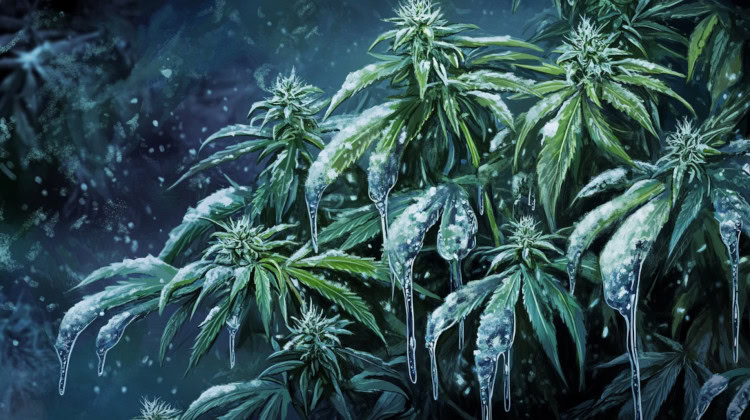Key Takeaways
- THC has the ability to lower body temperature.
- THC-induced hypothermia is not common and rarely extreme.
- Simple steps, like using cannabis in moderation and avoiding strains high in humulene, pinene, and linalool can decrease risks.
Cannabis has a diverse range of effects, from euphoria and relaxation to more subtle physiological changes. One such effect that may surprise users is THC-induced hypothermia. It's a condition where cannabis consumption can lower body temperature. Some may then wonder: does weed make you cold?
The condition raises further questions for patients, especially those sensitive to temperature changes. What is this cannabis compound-induced version of hypothermia? How does one prevent it to maintain their comfort and well-being?
What is THC-Induced Hypothermia?
Hypothermia occurs when the core body temperature reaches 95℉ or lower. THC-induced hypothermia is something that may occur after consuming cannabis. Still, it is extremely rare, and there have been no clinical trials on humans to indicate that this is a significant side effect.
One study on rats found that THC had the ability to induce hypothermia via CB1 receptor activation. There are a few limitations to the study, such as it not being done in humans.1 Still, overall, it gives us a look into why THC-induced hypothermia may occur.
THC-induced hypothermia symptoms may be less severe than those associated with standard hypothermia. Most people do not need to worry about their body temperature when using cannabis.
How Does THC-Induced Hypothermia Usually Feel?

More research is necessary to understand more about THC-induced hypothermia.
There are a variety of different accounts as to what experiencing THC hypothermia is like. Many people say that it feels alarming and can induce anxiety. Shivering or shaking is common in those experiencing it.
Is THC-induced hypothermia dangerous? This question is complicated because, yes, in a sense, THC hypothermia may be dangerous. However, this side effect is extremely rare and unlikely to be of concern to most consumers.
If you’re experiencing symptoms, it’s best to try to warm up, stay calm, and take your mind off what you’re feeling. Keep in mind that everyone experiences cannabis differently. The way that THC-induced hypothermia feels to one person will be different than it feels to another.
Some animal research has indicated that consumers may develop a tolerance to changes in body temperature over time with consistent cannabis use. This suggests that new cannabis users may be the most likely to experience THC-induced hypothermia-like symptoms.2
Why Does Weed Cause THC-Induced Hypothermia?
Cannabis has the unique ability to lower body temperature, but why exactly is that? There isn’t one single answer to this question.
The POAH, a part of the brain responsible for temperature regulation, has been found to have a highly concentrated amount of CB1 receptors. When THC is inhaled or ingested and absorbed into the bloodstream, it can activate these CB1 receptors, leading to lower body temperature. Another contributor to THC-induced hypothermia is that the body will reduce its oxygen use after cannabis consumption. This means the body won’t be able to produce as much heat, which can directly lead to a drop in body temperature.3
If you’re an experienced cannabis user, you may be less likely to experience THC-induced hypothermia due to building a tolerance.
If you’re concerned about using cannabis and it causing THC-induced hypothermia, there are several solutions. For example, have some blankets and comfort items close. One can also take a lower dosage and slowly increase as the risk subsides. Lastly, stay aware of THC-induced hypothermia symptoms so you can appropriately respond if they occur.
What Medical Implications are Associated With THC-Induced Hypothermia?

The good news is that THC hypothermia is rare and not likely to be severe. While you may be at a higher risk if you’re in a cold environment, it is likely to be extremely rare for THC-induced hypothermia symptoms to present a serious health risk.
If you know that you’re going to be in an extremely cold environment where you may already be at risk of hypothermia, it may be best to save your cannabis for another time. With that being said, most people likely do not need to worry about severe health effects from experiencing THC-induced hypothermia.
What Terpenes and Cannabinoids are Associated With THC-Induced Hypothermia?

Being strategic about certain terpenes and cannabinoids is one way to help reduce your chances of THC-induced hypothermia.
Some terpenes that you may want to avoid include α-humulene, β-pinene, geraniol, and linalool. Interestingly, β-caryophyllene has not been found to induce hypothermia, so strains that contain it might be viable options.4
Some consumers believe that CBD can lessen your chances of THC-induced hypothermia, but research has actually found the opposite in some cases.5 However, the combination may also have several health benefits and shouldn’t be disregarded for this risk for most consumers.
Researchers have found that lower doses of cannabis are more likely to cause hyperthermia, whereas higher doses are more likely to lead to hypothermia.6 It’s always best to play it safe and make sure that you’re taking a manageable dose - especially if it’s your first time!
References
- Nguyen JD, Creehan KM, Grant Y, Vandewater SA, Kerr TM, Taffe MA. Explication of CB1 receptor contributions to the hypothermic effects of Δ9-tetrahydrocannabinol (THC) when delivered by vapor inhalation or parenteral injection in rats. Drug Alcohol Depend. 2020;214:108166. doi:10.1016/j.drugalcdep.2020.108166
↩︎ - Nguyen JD, Grant Y, Kerr TM, Gutierrez A, Cole M, Taffe MA. Tolerance to hypothermic and antinoceptive effects of ∆9-tetrahydrocannabinol (THC) vapor inhalation in rats. Pharmacol Biochem Behav. 2018;172:33-38. doi:10.1016/j.pbb.2018.07.007
↩︎ - Rawls SM, Benamar K. Effects of opioids, cannabinoids, and vanilloids on body temperature. Front Biosci (Schol Ed). 2011;3(3):822-845. Published 2011 Jun 1. doi:10.2741/190 ↩︎
- LaVigne JE, Hecksel R, Keresztes A, Streicher JM. Cannabis sativa terpenes are cannabimimetic and selectively enhance cannabinoid activity. Scientific reports. 2021;11(1). doi:https://doi.org/10.1038/s41598-021-87740-8 ↩︎
- Taffe MA, Creehan KM, Vandewater SA. Cannabidiol fails to reverse hypothermia or locomotor suppression induced by Δ(9) -tetrahydrocannabinol in Sprague-Dawley rats. Br J Pharmacol. 2015;172(7):1783-1791. doi:10.1111/bph.13024 ↩︎
- Wenger T, Moldrich G. The role of endocannabinoids in the hypothalamic regulation of visceral function. Prostaglandins Leukot Essent Fatty Acids. 2002;66(2-3):301-307. doi:10.1054/plef.2001.0353
↩︎
The information in this article and any included images or charts are for educational purposes only. This information is neither a substitute for, nor does it replace, professional legal advice or medical advice, diagnosis, or treatment. If you have any concerns or questions about laws, regulations, or your health, you should always consult with an attorney, physician or other licensed professional.




